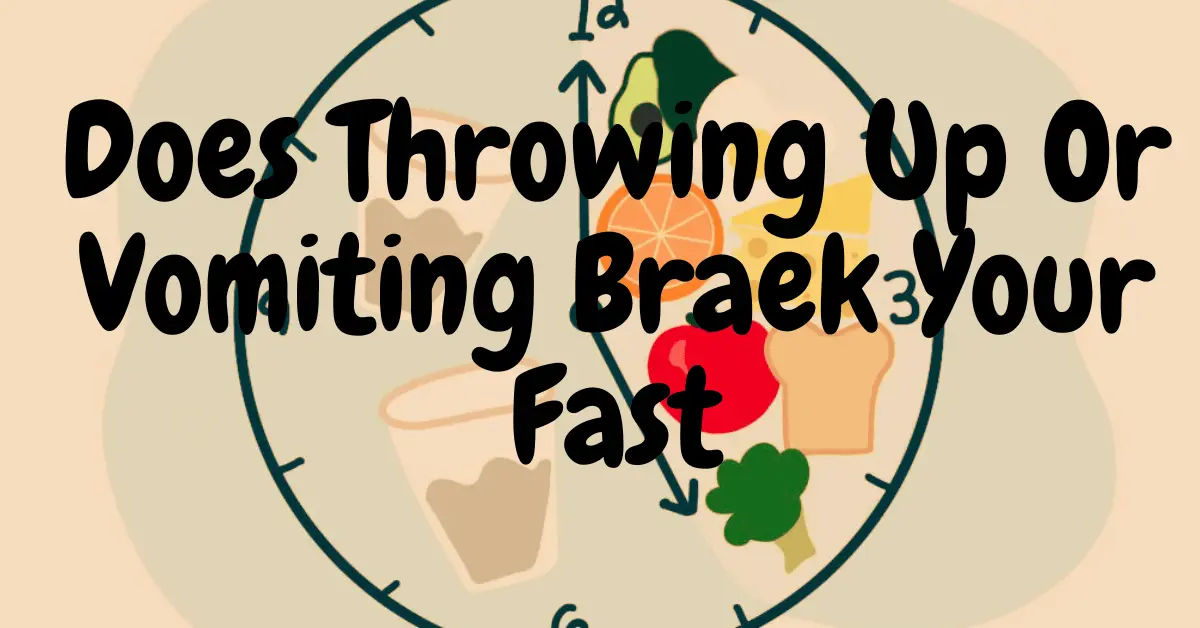Fasting has become increasingly popular in recent times due to its potential health benefits, such as weight loss, improved metabolic health, and increased longevity. As there are different fasting methods available, many people often wonder what actions could break their fasts. One common question arises does throwing up break your fast?
This article aims to explore the relationship between vomiting and fasting to offer a better understanding of this issue.
Understanding Fasting
Before we discuss the effects of vomiting on fasting, it’s essential to grasp the fundamental principles of fasting. Fasting involves abstaining from food and caloric beverages for a specified duration, and it comes in various forms, including intermittent fasting, extended fasting, and time-restricted eating.
The primary objective of fasting is to allow the body to rest from digestion, shifting into a state where it primarily utilizes stored energy reserves for sustenance.
Does Throwing Up Break Your Fast?
Involuntary vomiting during fasting doesn’t nullify the fast. Vomiting expels stomach contents, including recently consumed nutrients. If calories were ingested during the fast, vomiting could break it by removing those calories.
Distinctions between voluntary and involuntary vomiting and intentions impact the fast’s validity, and Islamic jurisprudence offers guidance in such cases.
Vomiting: A Natural Response
Vomiting is a physiological response by the body to expel the contents of the stomach, often in response to the presence of irritants or harmful substances. Causes of vomiting can range from infections and food poisoning to motion sickness and overeating.
It can also occur due to excessive alcohol consumption or the side effects of medications. Understanding the mechanisms behind vomiting is crucial in assessing its impact on fasting.
The Impact of Vomiting on Fasting
Whether or not vomiting breaks a fast is contingent on several variables:
1. Duration of Fasting
For short-term fasting, usually less than 24 hours, vomiting may have minimal impact on the overall fasting process. During short-term fasts, the body hasn’t fully depleted its glycogen stores and may quickly return to its fasting state after vomiting.
2. Calories and Nutrients
Vomiting involves the expulsion of stomach contents, which may include any calories and nutrients consumed before vomiting. If calories have been ingested during the fast, vomiting could indeed disrupt the fast by removing those calories from the system.
4. Hydration
Vomiting can lead to dehydration, which can be detrimental during fasting. Proper hydration is essential to support bodily functions and manage hunger during fasting. Vomiting-induced fluid loss can make fasting more challenging and uncomfortable.
5. Overall Health
Chronic or recurrent vomiting can signal underlying health issues. Frequent vomiting should prompt a medical evaluation, as it may indicate an illness or condition requiring treatment.
Fasting in Quran Verses
Fasting is a significant religious practice in Islam and is prominently mentioned in the Quran, the holy book of Islam. The primary form of fasting in Islam is observed during the month of Ramadan, but there are also other recommended fasts on specific days throughout the Islamic calendar. Below, I’ll discuss the key aspects of fasting as outlined in the Quran.
1. Ramadan Fasting (Sawm al-Ramadan):
The most well-known form of fasting in Islam is during the month of Ramadan. This fast is one of the Five Pillars of Islam, which are fundamental acts of worship for Muslims. The Quran specifically addresses the obligation of fasting during Ramadan in Surah Al-Baqarah (Chapter 2), verses 183-185:
“O you who have believed, decreed upon you is fasting as it was decreed upon those before you that you may become righteous. [Fasting for] a limited number of days. So whoever among you is ill or on a journey [during them] – then an equal number of days [are to be made up]. And upon those who are able [to fast, but with hardship] – a ransom [as substitute] of feeding a poor person [each day]. And whoever volunteers excess – it is better for him. But to fast is best for you, if you only knew.”
Fasting during Ramadan involves abstaining from food, drink, and other physical needs from dawn (Fajr) until sunset (Maghrib). It is a time for Muslims to focus on their spiritual growth, self-discipline, and empathy for the less fortunate. It’s also a period for increased prayer, reflection, and reading of the Quran.
2. Fasting on Other Occasions:
Besides Ramadan, there are additional fasts recommended in the Islamic tradition on certain days throughout the year. The Quran doesn’t provide specific details about these fasts but leaves room for their observance. One example is fasting on the Day of Ashura, which is mentioned in Surah Al-Baqarah (Chapter 2), verse 196:
“And complete the Hajj and ‘umrah for Allah . But if you are prevented, then [offer] what can be obtained with ease of sacrificial animals. And do not shave your heads until the sacrificial animal has reached its place of slaughter. And whoever among you is ill or has an ailment of the head [making shaving necessary must offer] a ransom of fasting [three days] or charity or sacrifice. And when you are secure, then whoever performs ‘umrah [during the Hajj months] followed by Hajj [offers] what can be obtained with ease of sacrificial animals. And whoever cannot find [or afford such an animal] – then a fast of three days during Hajj and of seven when you have returned [home]. Those are ten complete [days]. This is for those whose family is not in the area of al-Masjid al-Haram. And fear Allah and know that Allah is severe in penalty.”
These additional fasts are encouraged but not obligatory, and they offer an opportunity for Muslims to earn spiritual rewards and seek closeness to Allah.
Fasting is not only a physical act of abstaining from food and drink but also a spiritual practice that encourages self-control, increased devotion to God, and empathy for the less fortunate. It holds a central place in Islamic worship and serves as a means of purification and spiritual growth for Muslims.

Benefits of Fasting
1. Weight Loss and Fat Reduction
One of the most recognized benefits of fasting is weight loss. When you abstain from food for an extended period, your body’s primary source of energy shifts from incoming calories to stored energy reserves, namely glycogen and fat.
During fasting, insulin levels drop, which facilitates the release of stored fat for energy. This process, known as lipolysis, leads to weight loss and fat reduction.
How it works: When you consume fewer calories than your body needs, it creates a calorie deficit. This deficit forces your body to use its stored energy reserves, primarily fat, to meet its energy demands, resulting in weight loss over time.
2. Improved Insulin Sensitivity
Fasting can enhance insulin sensitivity, a critical factor in managing blood sugar levels. Insulin sensitivity refers to the body’s ability to effectively respond to insulin, a hormone responsible for regulating blood sugar. High insulin sensitivity means your cells are more responsive to insulin’s actions, allowing glucose to enter cells and lowering blood sugar levels.
How it works: Fasting reduces the frequency of insulin spikes and lowers overall insulin levels. This helps improve insulin sensitivity, potentially reducing the risk of type 2 diabetes and making it easier for the body to manage blood sugar.
3. Cellular Autophagy
Autophagy is a cellular process that eliminates damaged or dysfunctional components within cells. Fasting can stimulate autophagy, promoting the removal of these cellular “garbage” materials and facilitating cellular repair and rejuvenation.
How it works: During fasting, the body recognizes the need to conserve energy and begins recycling cellular components, enhancing cellular health. This process is associated with longevity and a reduced risk of age-related diseases.
4. Cardiovascular Health
Fasting may have several positive effects on cardiovascular health. It can help lower risk factors for heart disease, including reducing levels of triglycerides, LDL cholesterol, blood pressure, and inflammation in the body.
How it works: Fasting can improve lipid profiles by increasing the breakdown of stored fats and reducing the production of new fats. It also supports blood vessel function and may reduce oxidative stress, contributing to better cardiovascular health.
5. Mental Clarity and Cognitive Function
Many individuals report improved mental clarity and cognitive function during fasting periods. This is often attributed to the body’s shift into a state of ketosis, where it begins to use ketones (a byproduct of fat metabolism) as an energy source for the brain.
How it works: Ketones are believed to provide a more stable and efficient fuel source for the brain than glucose. As a result, some people experience enhanced focus, alertness, and cognitive function during fasting periods, which can be particularly beneficial for tasks that require mental clarity.
Conclusion
In conclusion, whether throwing up breaks your fast depends on various factors, including the duration of fasting, the contents of your stomach, hydration levels, and your overall health.
Short-term fasting may be less affected by vomiting, but it is essential to consider the potential consequences, such as calorie loss and dehydration. If you are following a fasting regimen and experience vomiting regularly or as a result of an illness, it is advisable to seek medical guidance to ensure your safety and well-being.
Remember that fasting should be approached with caution and tailored to your individual health needs and goals. Always consult with a healthcare professional or a registered dietitian before starting or modifying any fasting routine to ensure it aligns with your specific circumstances and health objectives.
FAQS
Fasting is broken by eating, drinking, sexual intercourse, menstruation, post-childbirth bleeding, or intentional vomiting.
Partial vomiting, where only a small amount of vomit is expelled, might not necessarily break your fast, but it can depend on individual circumstances and interpretations of Islamic jurisprudence.
Vomiting may break your fast, especially if you expel something you consumed during your fast. Consulting with a religious scholar or imam for guidance on your specific situation is advisable.


